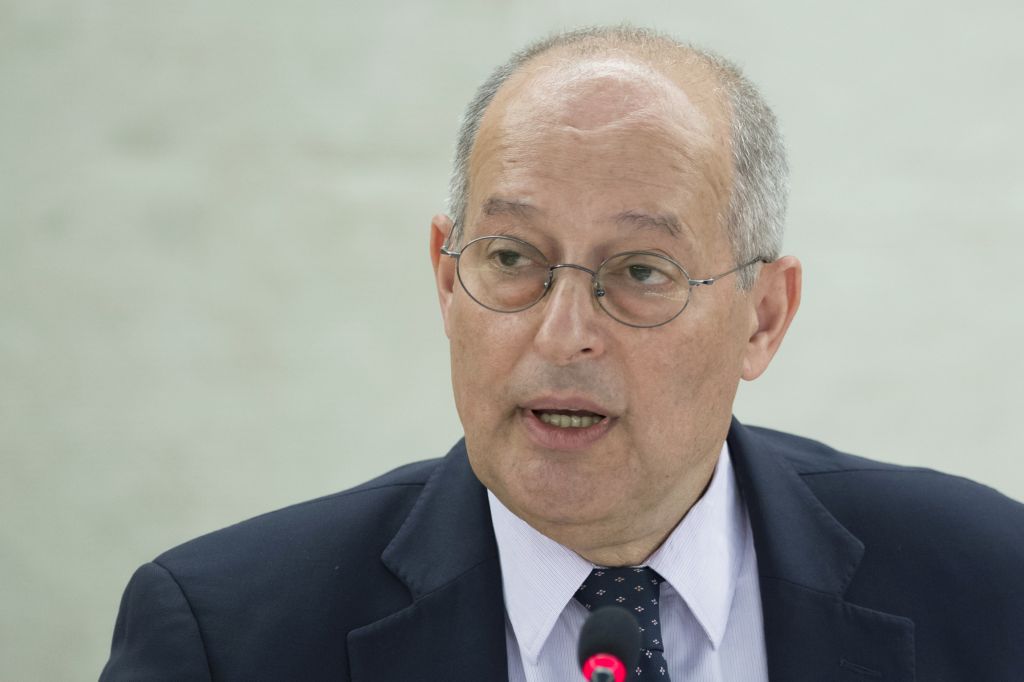At the presentation in New York, the Special Rapporteur said that there had been “no substantial improvements in the human rights situation over the past decade, despite numerous United Nations recommendations.” He claimed that the “smooth-looking conduct of recent parliamentary elections should not eclipse the underlying systemic violations,” and called the electoral process a “ceremonial tool used to perpetuate power.”
Tatsiana Reviaka, President of the Belarusian Human Rights House, welcomed the report and said that Belarusian human rights defenders evaluate the election results in the same way. She commented: “For us it is very important that Mr. Haraszti still sees, criticises and proposes to change the system of human rights violations that has been rooted in the country for many years and enshrined at the legislative level, and that he comprehensively assesses the state of human rights and freedoms.”
The Special Rapporteur described steps that could have “miraculous” effects on the human rights situation, such as the repeal of article 193.1 of the penal code, which criminalises all activity not permitted by the State, and which led to human rights organisations being made de jure criminal because they were not registered.
Straight after the elections, he called the situation “Lipstick measures on a face of violations,” and said that there were no improvements between this election and previous elections. These lipstick measures refer mainly to the election of two none pro-government MPs: one from the opposition and one an independent.
In his full report, the Special Rapporteur urges the government to “eliminate the permission-based registration procedure for assembly, association and the press and complete the denied registration of parties and civic and human rights organisation.” He also calls on the Government to “conduct prompt, impartial and thorough investigations, as well as prosecute and punish any acts of intimidation and violence against political leaders, human rights defenders and journalists.”
He concludes that “the environment in which elections are held in Belarus remains non-compliant with the international human rights standards recognised by Belarus,” underlining “the deprivation of a real space for citizens to express concerns,” and that “respect for the freedoms of expression, association and assembly continues to be deliberately ignored.”
Florian Irminger, Head of Advocacy at HRHF, commented: “The Special Rapporteur mandate is the only international independent monitor of human rights in Belarus. It is therefore essential that the international community looks to the findings and recommendations of the mandate when deciding how to proceed in their dialogue with Belarus.”
Despite the Special Rapporteur indicating that no real progress has been made in Belarus with regards to human rights, and his assertion that any signs of progress are merely cosmetic, some members of the EU Parliament referred to positive signs in Belarus during the Parliament’s debate on Belarus on 26 October. Polish MEP Bogdan Zdrojewski said that “there is some progress in Belarus,” and the EU needs “to find new channels of communication.”
Florian Irminger commented: “As indicated by the Special Rapporteur, Belarus has made no progress on human rights, except from the release of political prisoners, including Ales Bialiatski, who should have never been in prison anyway; any claims of such progress are false. The sad truth is that the situation only looks better now in Belarus – to an outsider – because the situation in other countries in the region has so drastically deteriorated since 2012, when the Special Rapporteur mandate on Belarus was created.”
The official representative of Belarus at the debate in New York again declared non-recognition of the Special Rapporteur’s mandate.
Tatsiana Reviaka called this “a signal from the Belarusian authorities to the UN structures, UN member states, and also to Belarusian human rights defenders and all citizens: the authorities are going to do in the field of human rights only what they consider necessary and useful for themselves in a given period of time – to maintain full monopoly on decision-making in the country, to maintain total control over all civic and political processes in the country.”
She pointed to the need to preserve the independent and objective voice of the Special Rapporteur, “who can inform the international community about the real situation of human rights in Belarus.”
Documents:
- Position Paper on Belarus: A system that allows human rights violations at any given time
HRHF detailed its advocacy position on Belarus in its May 2016 paper: A system that allows human rights violations at any given time.
Special Rapporteur on Belarus report to UN General Assembly
The UN Special Rapporteur on Belarus, Miklós Haraszti, presented his report to the General Assembly on 27 October 2016. The report focuses on human rights in electoral processes in Belarus, especially in the context of the parliamentary elections held on 11 September 2016.
Related content
Far from free elections in Belarus
HRHF calls for civil society space during electoral processes





